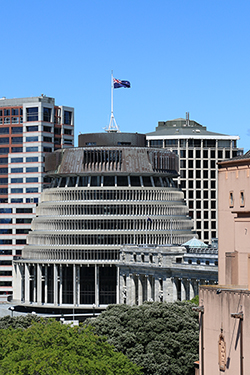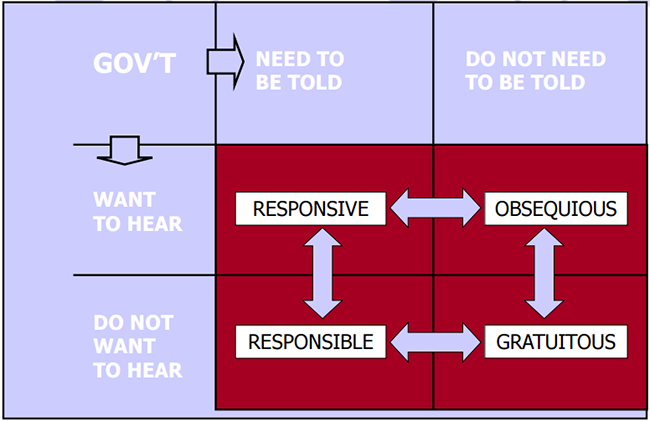Free and frank advice to Ministers: why it matters…
 So what’s so important about free and frank advice? And what does that term even mean?
So what’s so important about free and frank advice? And what does that term even mean?
The Forum was chaired by Don Hunn, senior diplomat and civil servant (and head of the public service during the public sector reforms in the 1980s). Mr Hunn introduced Peter Hughes – the current State Services Commissioner who spoke about the five tenets that underpin the public service:
- Political neutrality
- Free and frank advice
- Merit-based appointments
- A commitment to open government
- The notion of stewardship
It is the responsibility of each generation of public servants, Mr Hughes said, to champion these values, to make them relevant and to safeguard them for future generations. They are principles that need looking after and are important constitutional conventions that enable the public service to give advice to Ministers on how to achieve the government’s goals.
The SSC website provides useful guidance about exactly what free and frank advice looks like. It’s advice that:
- Identifies the nature, scale and significance of a policy issue or opportunity (with supporting evidence)
- Is politically neutral while also being aware of relevant political contexts
- Recognises the historical, contemporary and potential longer-term dimensions or conditions
- Is comprehensive, objective, and balanced to cover the range of options that address the issue(s)
- Is honest about where the opportunities, benefits, costs, pitfalls, and risks of all options are and about the limitations, assumptions, and information gaps in analysis
- Is clear about any trade-offs involved and which option(s) on balance are recommended
- Delivers any hard truths in the most constructive way possible
- Covers implementation considerations.
Mr Hughes was clear that officials should not be blind to the political context when giving advice to Ministers, but must also always be careful to remain politically neutral. He stressed the need for advice to be objective and evidence-based and reminded the audience that free and frank doesn’t mean “gung-ho”. Officials need to provide nuanced advice that acknowledges a Minister’s priorities and communication style preferences, but still offers robust evidence-based advice on how best to achieve policy outcomes.
Providing free and frank advice isn’t easy. Mr Hughes talked about some of the changes that present challenges to officials – operating in an MMP environment with coalition agreements in place, a change to much faster-moving digitally enabled communication channels, and the increased role of political advisers in Ministers’ offices.
Dr Chris Eichbaum from the School of Government at Victoria University picked up this point in his presentation, talking about his academic research undertaken with Richard Shaw, Professor of Politics at Massey University. Together they interviewed 640 public servants and reached the view that advice has become more guarded over time. And the role of political advisers in Ministers’ offices can sometimes frustrate the important role of the public service to discharge its constitutional responsibilities.
Dr Eichbaum referred to some advice provided in a 2007 speech by Australian Treasury Secretary Ken Henry to his staff about four different dimensions of policy advice. He made the point that free and frank advice becomes most important when giving advice that Ministers need to be told but maybe don’t want to hear.

As always in these sessions, there’s great value in the discussions that follow and this month’s topic generated lively input from the audience of mostly senior public servants. Opinions differed as to whether officials had become less free and frank in their advice to Ministers or whether there remained cause for optimism. One point participants did agree on was that Ministers needed a “safe space” to consider advice from officials, particularly in the early stages of policy development before agreed advice goes to Cabinet for decision-making. Several noted the supportive role played by the Ombudsman’s Office in helping protect free and frank advice under the Official Information Act.
The discussion left me with plenty to mull over. As someone who has worked in the New Zealand public sector for nearly 25 years, I have shared many conversations with colleagues about why we do it – and the story always has the same common thread. We come to work not just to pay the bills but to make a difference for New Zealanders. Something Peter Hughes refers to as a spirit of service. For those charged with supporting Ministers to achieve their policy outcomes, providing free and frank advice is an essential part of making that difference.
